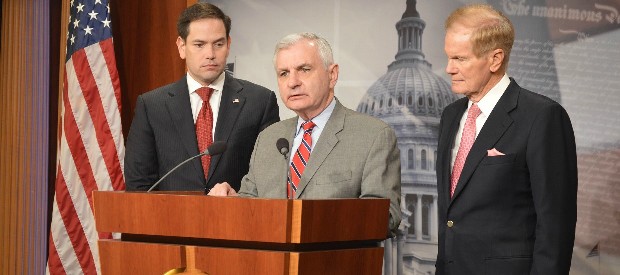Ahead of One Year Anniversary of Parkland Tragedy, Rubio, Reed Re-Introduce Bipartisan “Red Flag” Bill

WASHINGTON, DC – U.S. Senators Marco Rubio (R-FL), Jack Reed (D-RI), Angus King (I-ME), and Susan Collins (R-ME) today re-introduced the bipartisan Extreme Risk Protection Order and Violence Prevention Act, which will dedicate Department of Justice funds to incentivize states to give law enforcement the authority to prevent individuals who pose a threat to themselves or others the ability to purchase or possess firearms, while still providing due process protections.
Senators Rubio and Reed first introduced this bill in March of 2018, following the tragedy at Marjory Stoneman Douglas High School in Parkland, Florida.
“A gun violence restraining order is one of the most effective policies we can put in place to prevent another tragedy like Parkland,” Senator Rubio said. “We can help keep our schools and communities safe by empowering law enforcement or family members to use the judicial system to keep guns out of the hands of dangerous individuals. This idea has already proven successful in states like Florida, and it is my hope that this bill will get other states to do the same thing.”
“Our schools and many other public places are too often the targets of gun violence. We have a duty to do more to prevent this kind of violence. This bipartisan bill gives law enforcement and concerned family members a way to petition state and tribal courts to keep guns away from people who have exhibited serious, documented signs of danger and violence to themselves or others,” said Senator Reed. “Red and blue states alike have been out front on this issue, adopting so-called ‘Red Flag’ laws. Our bipartisan initiative builds on these state solutions that already exist in states like Florida and Rhode Island, and provides incentives to effectively run and improve these important state efforts. It doesn’t force states to act, but encourages states that do. We must come together and do more to prevent gun violence, and passing this bipartisan bill would be a major step in the right direction.”
“Too many families, in too many communities across America, have felt the pain of losing a loved one to gun violence,” said Senator King. “Far too often, we learn after the fact that many tragic mass shootings were committed by individuals who displayed warning signs of emotional or mental distress, and were still able to purchase a gun. These horrific losses could have possibly been prevented — but they weren’t, and that’s simply unacceptable. This isn’t about infringing upon the Second Amendment rights of law-abiding gun-owners – it’s about using due process to pursue a proactive approach to save lives by intervening early with those who have shown significant danger to harm themselves or others.”
“Gun violence is a problem that affects far too many communities across the country,” said Senator Collins. “Family members and law enforcement officers are often in the best position to identify when someone poses an immediate threat to themselves or others, but in many cases they are unable to intervene before it is too late. Our bipartisan legislation would provide a way for them to temporarily prevent dangerous individuals from possessing firearms. Several states already have ‘red flag’ laws, which enhance gun safety while retaining important due process protections and preserving the Second Amendment rights of law-abiding citizens.”
SUMMARY: The Extreme Risk Protection Order and Violence Prevention Act:
- Creates an Extreme Risk Protection Order Grant Program at the Department of Justice
- Makes states enacting qualifying laws eligible for funding to help implement such laws, as well as priority consideration for Bureau of Justice Assistance discretionary grants.
- Requires that a qualifying state law be in compliance with the minimum requirements described in the act, including:
o Providing a process where a law enforcement officer or family member of an individual can petition for – and after notice and hearing, a court can grant – an Extreme Risk Protection Order if the court finds by clear and convincing evidence that such individual poses a significant danger of causing personal injury to himself/herself or others by possessing or purchasing a firearm.
– The duration of such order may not exceed 12 months but may be renewed upon a showing of clear and convincing evidence it remains warranted.
– Respondent has the right to request a hearing to vacate an order or renewal.
o Providing a process where a Temporary Ex Parte Extreme Risk Protection Order can be issued if a court finds probable cause to believe that an individual poses a significant danger of causing personal injury to himself or herself or others in the near future by possessing or purchasing a firearm.
o Establishing a felony criminal offense for knowingly making a false statement relating to an Extreme Risk Protection Order regarding a material matter.
o Requiring clear processes and instructions for the surrender of a respondent’s firearms should an Extreme Risk Protection Order be issued, as well as clear processes and instructions for the swift return of such firearms upon expiration or successful motion to vacate an order.
o Requiring that an issuance of an Extreme Risk Protection Order be reported to the appropriate federal, state, and tribal databases.

